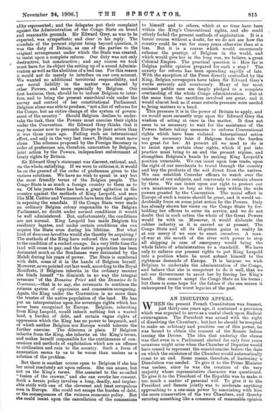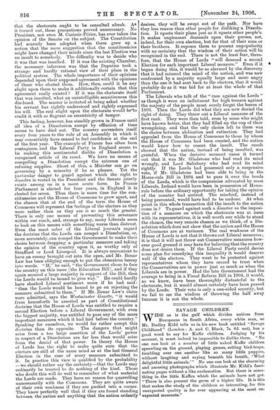AN INSULTING APPEAL.
WHEN the present French Constitution was framed, just thirty-one years ago, it contained a provision which was expected to serve as a useful check upon Radical extravagance. The President was armed with the right of dissolving the Chambers ; but lest he should be tempted to make an arbitrary and punitive use of this power, he was bound to obtain the consent of the Senate before issuing the Decree. The idea that underlay the clause was that even in a Parliament elected for only four years occasions might arise when the Chamber of Deputies would have ceased to represent the constituencies before the date on which the existence of the Chamber would automatically come to an end. Some means, therefore, of hastening a Dissolution was needed. To give it to the Prime Minister was useless, since he was the creature of the very majority whose representative character was questioned. To give it to the President of the Republic was to make it too much a, matter of personal will. To give it to the President and Senate jointly was to moderate anything approaching to a one-man power by associating with him the more conservative of the two Chambers, and thereby securing something like a consensus of reasonable opinion that the electorate ought to be consulted afresh. As it turned out, these precautions proved unnecessary. No President, not even M. Casimir-Perier, has ever taken the opinion of the Senate on the subject. The Constitution had scarcely been adopted when there grew up a notion that the mere suggestion that the constituencies might have changed their minds since the last Election was an insult to somebody. The difficulty was to decide who it was that was insulted. If it was the existing Chamber, the necessary inference was that the Deputies took a strange and hardly rational view of their place in the political system. The whole importance of their opinions depended upon their supposed agreement with the opinions of those who elected them. How, then, could it be any slight upon them to make it additionally certain that this agreement really existed ? If it was the electorate itself that was insulted, what an unintelligible sensitiveness this disclosed. The master is irritated at being asked whether his servant has rightly understood and rightly expressed his will. The real slight upon the electorate would beto credit it with so flagrant an eccentricity of temper.
This feeling, however, has steadily grown in France until all idea of a Dissolution except by effiuxion of time seems to have died out. The country surrenders itself every four years to the rule of an Assembly in which it may conceivably have ceased to feel confidence at the end of the first year. The example of France has often been contagious, and the Liberal Party in England seems to be making this sentimental dislike of Dissolution a recognised article of its creed. We have no means of compelling a Dissolution except the extreme one of refusing supplies. Short of this, a Minister can go on governing by a minority if he so pleases. Yet the particular danger to guard against which the right to dissolve is vested in the President and the Senate jointly exists among us in a more acute form. In France Parliament is elected for four years, in England it is elected for seven. Thus there is more time for the con- stituencies and the House of Commons to grow apart, and the chance that at the end of the term the House of Commons will represent the feelings of the electors as they were rather than as they are is so much the greater. There is only one means of preventing this severance within our reach, and, strange to say, many Liberals seem to look on this means with something worse than distrust. Even the most sober of the Liberal journals regard the doctrine that the Lords can compel a Dissolution, or, more accurately, can compel the Government to make their choice between dropping a particular measure and taking the opinion of the country upon it, as worthy only of Strafford or Lord Liverpool. It is always convenient to have an enemy brought out into the open, and Mr. Bonar Law has been obliging enough to put the obnoxious heresy into words. "If," he said, "the Government chose to face the country on this issue [the Education Bill], and if they again secured a large majority in support of the Bill, then the Lords would be bound to give way." He could hardly have shocked Liberal sentiment more if he had said : "then the Lords would be bound to go on rejecting the measure submitted to them." If Mr. Bonar Law's claim were admitted, says the Westminster Gazette, "it would from henceforth be asserted as part of Constitutional doctrine that the House of Lords was entitled to require a second Election before a Liberal Government, with even the biggest majority, was entitled to pass any of the more important measures which it had laid before the country." Speaking for ourselves, we would far rather accept this doctrine than its opposite. The dangers that might arise from a too large assertion of the Lords' power in respect of a Dissolution are far less than would arise from the denial of that power. In theory the House of Lords has the right to make quite sure that the electors are still of the same mind as at the last General Election in the case of every measure submitted to it. In practice this view is qualified by the probability —we should rather say the certainty—that the Lords may ordinarily be trusted to do nothing of the kind. Those who doubt this will do well to remember of what material the Lords are made. They have no reason for quarrelling unnecessarily with the Commons. They are quite aware of their own weakness if they are pushed into a corner. They know perfectly well that if they are found standing between the nation and anything that the nation ardently desires, they will be swept out of the path. Nor have they less reason than other people for disliking a Dissolu- tion. It upsets their plans just as it upsets other people's. It makes unpleasant demands upon their purses, not, indeed, for their own election, but for that of their eons or their brothers. It exposes them to present unpopularity with no certainty that the wisdom of their action will be recognised in the end. There is not the least fear, there- fore, that the House of Lords "will demand a second Election for each important Liberal measure." Even if it began doing this, it would be so alarmed by the discovery that it had misread the mind of the nation, and was now confronted by a majority equally large and more angry than the one it had sent back to the electors, that it would probably do as it was bid for at least the whole of that Parliament.
The Liberals who talk of the "case against the Lords" as though it were an indictment for high treason against the majesty of the people must surely forget the lesson of 1893. Then the Lords did what they are now denied the right of doing. They threw out a Liberal measure of the first rank. They were then told, even by some who might have known better, that they had filled up the cup of their wrongdoing, and that the only choice left to them was the choice between abdication and extinction. They had appealed from the House of Commons to those by whom the House of Commons had been created, and the nation would know how to resent the insult. The result showed that the nation, instead of being insulted, was grateful. When the decisive moment came it turned out that it was Mr. Gladstone who had read its mind wrongly, and Lord Salisbury who had read its mind rightly. If the Lords had possessed only a suspensive veto, if Mr. Gladstone had been able to bring in the Home-rule Bill in 1894 and to pass it over the beads of the Lords, which is the compromise advocated by most Liberals, Ireland would have been in possession of Home- rule before the ordinary opportunity for taking the opinion of the country had arrived. The mischief, instead of being prevented, would have had to be undone. At what point in this whole transaction did the insult to the nation come in ? To guard against such a disaster as the imposi- tion of a measure on which the electorate was at issue with its representatives, it is well worth our while to stand the chance, the very remote chance as we think, of a Dis- solution which does not show that the nation and the House of Commons are at variance. The real weakness of the House of Lords is not that it throws out Liberal measures; it is that it will not throw out Conservative measures how- ever good ground it may have for believing that the country does not desire them. If the Liberal Party could devise some plan for remedying this inequality it would deserve well of the electors. They want to be protected against representatives whom they have ceased to trust when the Conservatives are in power just as much as when the Liberals are in power. Had the late Government had the courage to bring in a Fiscal Reform Bill in 1904, it would, as we know, have been thoroughly distasteful to the electorate, but it would almost certainly have been passed by the Lords. Their veto is only a. one-sided security, but we fail to see the wisdom of throwing the half away because it is not the whole.















































 Previous page
Previous page